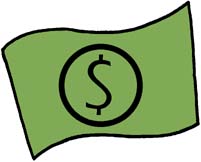For those of you who’ve been listening to my morning radio program, you’re all-too-familiar with the “Leviticus 19:36” principle. In this sometimes dry book of the Old Testament we find God’s warning against using dishonest measurements for grain and liquid. While that may sound like an irrelevant concept to those of us living in the twenty first century, it is more applicable to our current condition than you may think. It’s all about reading the passage in the context of its times.
Most economies at the time of the writing of Leviticus were agrarian based. As such, God’s warning about using honest liquid and dry measures were directed toward their trade practices. Most economic transactions were completed by the barter system which, quite often, included the transfer of milk, grain and the sort. As such, God’s warning to use honest measurements would be the equivalent of His telling us in our time to avoid currency manipulation.
As it turns out, Seth Lipsky recently addressed this very topic in an edition of Imprimis, a publication of Hillsdale College. Lipsky held forth on the concept of a fiat (effectively unsecured) currency, such as the dollar, and the danger inherent in allowing it to float without any point of reference. Since the removal of the American Dollar from the gold standard, the dollar’s value has inflated and deflated rather wildly, which poses a very real threat to the property rights of all Americans. Think about it: if you hold a CD account worth $400,000, you’d prefer the value of those dollars to remain constant. Consistent inflation will leave you with a devalued retirement fund, a diminished college account and real properties that don’t generate a real return on your investment.
Truth is the foundation for the future. I’ve oft discussed the importance of absolutes as they pertain to marriage, education, and the defense of the preborn. Now, I’m as convinced that Truth must be the foundation of our economic policy. I’ve frequently stated, in defense of traditional marriage, that “if marriage is defined as everything, it truly means nothing.” The same is true with the value of our currency: if its value is absolutely relative, it is absolutely worthless.
I believe it’s time for Americans to demand accountability from their government. We must work to reduce the deficit, balance the budget and set American currency on a consistent standard that precludes constant cycles of inflation and deflation. The property rights and freedom of the American People are contingent upon it.






One of the greatest periods of currency and price deflation was during the Great Depression when we were still hinged to the gold standard. It wasn’t until we floated the currency and flooded the market with currency that we began to see real economic improvement.
The fed sets a target inflation rate – since we floated our currency, that target rate has remained relatively stable. If you exclude historically volatile commodity prices (which have surged and crashed over the period of a few months), our inflation has been on target.
What type of solutions are you advocating when you say ‘set American currency on a consistent standard?’ Are you aware of why we floated our currency in 1971? In reference to your CD comment, are you aware that the rate is set so low to try and force the money into the market and out of savings… an act done to prevent the deflationary cycle that we were recently faced with.
Jerry, thanks for your comments, and the time you took to write. I’m not arguing in favor of a renewed gold standard policy, per se. I believe, however, that we need to stop the inflationary / deflationary cycles that result from excessive borrowing, issuance of additional Treasury bond debt to satisfy that debt and continued recklessness with regard to the debt ceiling. In short, I believe in a set standard value, not that it necessarily need be pegged to gold, etc.
I’m interested to hear your thoughts on the current deflationary cycle that the housing market is experiencing and how it correlates with public debt. I’m not certain that I see how the two are related.
I also can’t think of anytime in recent history that a major currency was pegged to something other than a precious metal.
It’s one thing to point out the weaknesses of our current system, but without highlighting possible solutions you fail to win the debate solely on the basis that you offer no alternatives. I’d be interested to hear exactly what you think a proper alternative is.